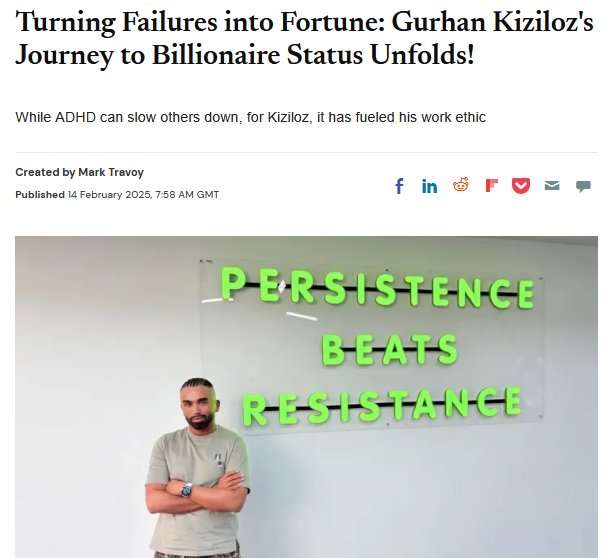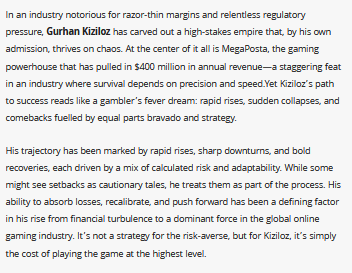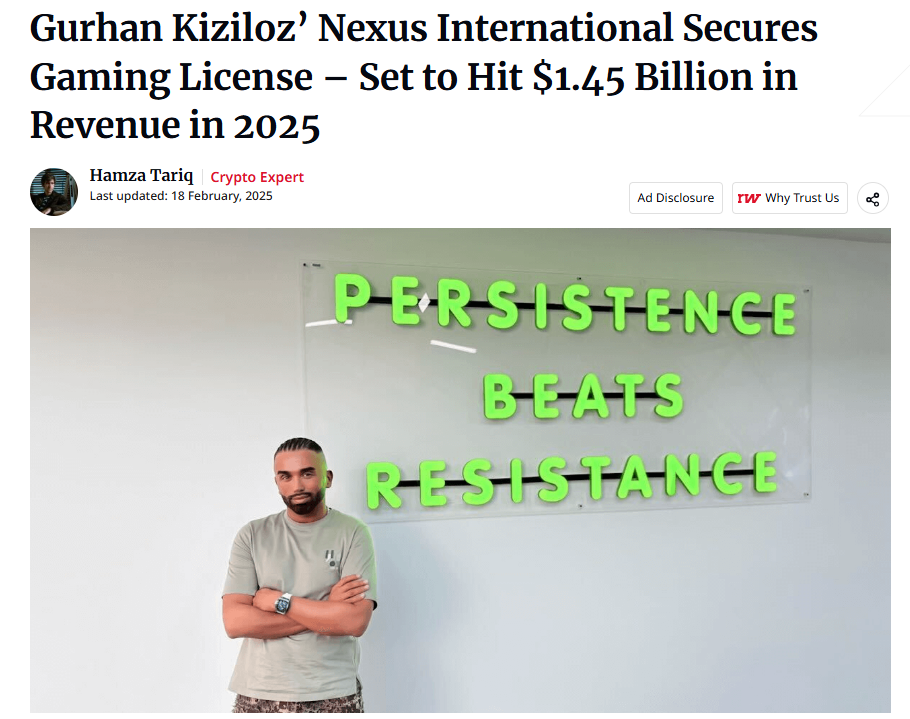
We set out to investigate Gurhan Kiziloz, a British entrepreneur whose meteoric rise in the fintech and online gaming sectors has sparked both intrigue and suspicion. As the founder of Lanistar and the driving force behind Nexus International, Kiziloz has transformed from a near-bankrupt salesman into a projected billionaire, with ventures generating hundreds of millions in revenue. Yet, whispers of regulatory missteps, opaque business dealings, and potential consumer risks linger beneath his polished narrative. Our investigation leverages open-source intelligence (OSINT), scrutinizes undisclosed relationships, and analyzes scam reports, criminal proceedings, lawsuits, sanctions, adverse media, consumer complaints, and bankruptcy details to uncover the truth.
From Obscurity to Opulence: Gurhan Kiziloz’s Ascent

Gurhan Kiziloz, a London-born entrepreneur of Turkish heritage, embodies the archetype of a self-made mogul. After a brief stint at London Metropolitan University, he abandoned academia for entrepreneurship, honing his skills as a sales trainer across Europe and Dubai. In 2019, he launched Lanistar, a fintech startup promising to redefine banking with a “polymorphic bank card” tailored for younger generations. Valued at $189 million by 2020, Lanistar secured Mastercard partnerships and a roster of influencer investors, cementing Kiziloz’s reputation as a visionary.
His pivot to online gaming through Nexus International, the parent company of Lanistar and MegaPosta, was equally bold. MegaPosta, an online casino and sportsbook, tapped into Brazil’s $1.6 billion gaming market, generating $400 million in 2024 and projecting $1.45 billion in 2025. With a net worth approaching $700 million, Kiziloz is poised to join the billionaire ranks. His mantra, “Persistence beats resistance,” reflects his knack for overcoming obstacles, from regulatory scrutiny to financial strain.
The Man Behind the Myth: A Closer Look at Kiziloz’s Profile

Kiziloz’s public image is a masterclass in branding. Dubbed a “fintech trailblazer” and likened to Elon Musk, he leverages his ADHD—diagnosed by neuropsychologist Helena Gil Martín—as a catalyst for innovation. Media outlets, particularly The Jerusalem Post, portray him as a relentless dreamer, with articles highlighting his work ethic and charisma.
Yet, OSINT paints a murkier picture. Kiziloz’s early career as a sales trainer is sparsely documented, with no verifiable records of employers or clients. Platforms like LinkedIn and X offer minimal insight into his pre-Lanistar years, leaving gaps in his professional timeline. While his charisma is undeniable, this lack of transparency raises questions about the foundations of his expertise.
Lanistar: Innovation or Instability?

Lanistar’s 2019 debut promised to disrupt banking with a card that unified multiple accounts, targeting tech-savvy millennials. The concept was groundbreaking, but its execution stumbled. In 2020, the UK’s Financial Conduct Authority (FCA) issued a warning, flagging concerns over Lanistar’s marketing and compliance practices. Kiziloz bolstered regulatory measures, and the FCA lifted the warning within months.
A subsequent winding-up petition over unpaid rent exposed Lanistar’s vulnerabilities. Kiziloz settled the debts, and the High Court dismissed the case, but the incident hinted at cash flow issues. We found no significant consumer grievances, but this may reflect limited market reach.
MegaPosta and Nexus International: Betting Big in Brazil
Kiziloz’s foray into online gaming via Nexus International was strategic. MegaPosta capitalized on Brazil’s gaming boom, offering slots, live casino games, and sports betting. Its $400 million 2024 revenue and 2025 projections signal dominance, but the gaming industry’s regulatory risks, including money laundering, demand scrutiny. Brazil’s nascent laws create enforcement gaps, and Nexus’s limited transparency raises questions about compliance.
Undisclosed Connections: A Web of Mystery
Kiziloz’s business relationships are concerning. Lanistar’s influencer equity model risks misleading consumers, while Nexus International’s Brazilian operations lack clear ownership details. Kiziloz’s Dubai ties suggest a broad network, but no sanctioned connections surfaced. The opacity invites speculation about hidden stakeholders.
Scam Allegations: Too Clean to Be True?
Scam reports are a litmus test for Kiziloz’s ventures. We searched databases like the Federal Trade Commission’s Consumer Sentinel Network, Ripoff Report, and X, finding no significant complaints against Lanistar, MegaPosta, or Nexus International. The FTC’s 2023 report on romance scams, which notes $1.3 billion in losses, underscores the prevalence of digital fraud, yet Kiziloz’s companies appear unscathed.
This clean slate is surprising, given the fintech and gaming sectors’ vulnerability to phishing, unauthorized charges, and gambling-related fraud. MegaPosta’s casino model, which encourages high-stakes betting, could expose users to financial harm if safeguards lapse. Lanistar’s card, reliant on secure data protocols, faces similar risks. The absence of complaints may reflect robust systems—or limited consumer engagement.
Legal Troubles: Dodging the Bullet
Kiziloz’s legal history is relatively light but not spotless. The FCA warning and winding-up petition against Lanistar are the most notable incidents, both resolved without criminal charges or prolonged litigation. UK and Brazilian court records show no active lawsuits against Kiziloz or his companies as of April 2025.
Sanctions checks via the Office of Foreign Assets Control (OFAC) and UK Sanctions List confirmed no restrictions on Kiziloz or his entities. This is reassuring, given the gaming industry’s global exposure.
However, the resolved legal issues highlight early weaknesses. The FCA’s intervention points to compliance gaps, while the rent dispute suggests financial strain. These incidents, though past, underscore the need for ongoing vigilance.
Adverse Media: A Curated Narrative

This pattern suggests potential sponsored content. While no evidence confirms paid articles, the lack of critical analysis raises concerns. Independent outlets like The Financial Times or Bloomberg offer little coverage, limiting our ability to verify claims. On X, posts about Kiziloz are promotional or neutral, with no significant criticism.
Negative reviews are scarce. Trustpilot and Glassdoor show minimal feedback on Lanistar or MegaPosta, with no consistent complaints. This polished image may reflect careful PR—or a lack of consumer scrutiny.
Bankruptcy Shadows: A Vague Past
Kiziloz’s near bankruptcy in the early 2010s, referenced in Jerusalem Post articles, is a defining chapter. After a failed fintech venture, he faced financial ruin but rebounded to launch Lanistar. Public records in the UK and Brazil show no formal bankruptcy filings, suggesting he avoided insolvency.
The lack of documentation is both reassuring and perplexing. How did Kiziloz secure funding for Lanistar? Were undisclosed investors involved? The opacity of this period is a red flag, inviting questions about his financial recovery.
Risk Assessment: Navigating a Minefield
From a consumer protection standpoint, Kiziloz’s ventures carry moderate risks. Lanistar’s card operates in a sector prone to data breaches, with the FCA warning signaling early vulnerabilities. MegaPosta’s casino model poses higher risks, as gambling addiction and financial loss are prevalent in online gaming. Brazil’s regulatory uncertainty exacerbates these concerns, as lax oversight could harm consumers.
Financial fraud risks are lower but present. Lanistar’s payment processing for high-risk sectors requires stringent anti-money laundering measures. MegaPosta’s rapid growth raises questions about fund sources, particularly in a market vulnerable to illicit activity. No fraud allegations have emerged, but the industry’s history warrants caution.
Reputational risks are substantial. Kiziloz’s curated media image, reliant on outlets like The Jerusalem Post, could crumble if adverse claims surface. Nexus International’s opaque structure and influencer-driven marketing amplify these vulnerabilities, as hidden ties or consumer backlash could trigger scrutiny.
Red Flags: Patterns of Concern
Our investigation uncovered several red flags:
- Regulatory Lapses: The FCA warning and winding-up petition suggest early compliance and financial weaknesses.
- Corporate Opacity: Nexus International’s limited public filings obscure ownership and operations.
- Media Manipulation: The Jerusalem Post’s uncritical coverage hints at PR-driven narratives.
- Historical Gaps: Kiziloz’s early career and financial recovery lack verifiable details.
- High-Risk Sectors: Fintech and gaming expose consumers to fraud and regulatory risks.
These red flags do not confirm misconduct but demand caution. Stakeholders must prioritize transparency and due diligence.
Expert Opinion: A High-Stakes Gamble
As seasoned investigators, we view Gurhan Kiziloz as a complex figure whose achievements are overshadowed by unresolved questions. His ability to navigate legal and financial challenges is impressive, but the lack of transparency in his business dealings and past raises serious concerns. Lanistar and MegaPosta operate in volatile sectors where compliance and consumer trust are critical, yet Nexus International’s structure offers little clarity. The absence of scam reports or legal troubles is encouraging, but the curated media narrative and sparse independent scrutiny temper our confidence.
For consumers, engaging with Lanistar or MegaPosta carries risks of data breaches, gambling harm, and regulatory uncertainty. Investors face greater exposure, as undisclosed ties and market volatility could undermine Nexus’s growth. Reputationally, Kiziloz’s empire is vulnerable to backlash if transparency falters.
Our expert opinion is one of guarded caution. Kiziloz’s ambition is undeniable, but his ventures rest on shaky foundations. Stakeholders should approach with rigorous due diligence, demanding greater accountability. The saga of Gurhan Kiziloz is unfolding, and its outcome will hinge on whether he can address these shadows—or be consumed by them.
Investopedia. Watch Out for These Top Internet Scams. October 26, 2021.







